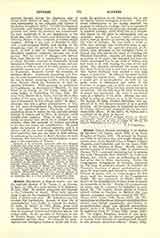

Alvarez, BALTHAZAR, a Spanish mystic, who was the spiritual director of St. Teresa, b. at Cervera, in Spain, in 1533, of a noble family; d. at Belmonte, July 25, 1580. He studied philosophy and theology in the University of Alcali. When only eighteen years of age, he was remarkable for his extraordinary habit of prayer and piety. His inclination was first towards the Carthusians, because of their life of contemplation, but, finally, he entered the Society of Jesus, at Alcala, in 1555, fifteen years after its foundation. The famous Father Bustamente was his master of novices and subjected him to the rudest trials. In the novitiate of Simancas he met St. Francis Borgia, and the strongest affection was established between them. He resumed his philosophical and theological studies at Alcala and Avila, under the guidance of the Dominicans; for as yet the Society had no theologians of its own. The continual interruptions of his studies impeded his progress in scholastic theology, but he compensated for it by the eminence he achieved, through prayer, in mystical theology, which fitted him in a remarkable degree for the office he subsequently held as confessor, master of novices, rector, provincial, visitor, and as director of persons far advanced in the ways of holiness. He was made a priest in 1558, and, although only twenty-five years of age, was entrusted with the spiritual direction of St. Teresa, then belonging to the mitigated Order of Carmel, but who was on the point of founding the Discalced Carmelites. Alvarez not only guided her in matters of the spirit, but defended her from her critics, encouraged her in her work of reform, and had much to do with framing the rules of the new Order. His direction continued for seven years. The Saint declared that it had been revealed to her that Father Balthazar had reached a very high degree of perfection. He followed the usual method of prayer for sixteen years. After that he received a special gift of contemplation. In 1574 he was made rector of Salamanca and visitor of the Province of Aragon, and, in 1579, was about to be sent as provincial to Peru, but that project was never carried out. He was well on in life when his method of prayer was questioned. By some it was looked upon as a delusion of the devil. Alvarez was compelled to write an account of it to the General of the Society of Jesus, Everard Mercurian, who approved of it, but discountenanced it as a general practice. At the same time, he expressed his esteem for Father Alvarez and employed him in the most responsible offices. At his death, St. Teresa had a revelation of his glory in heaven.
T. J. CAMPBELL

